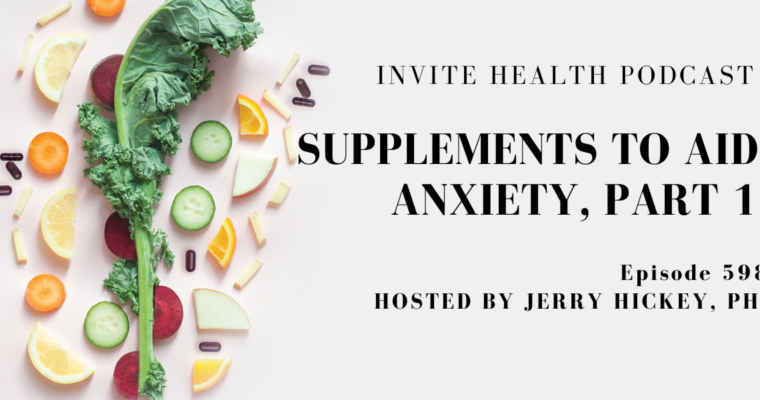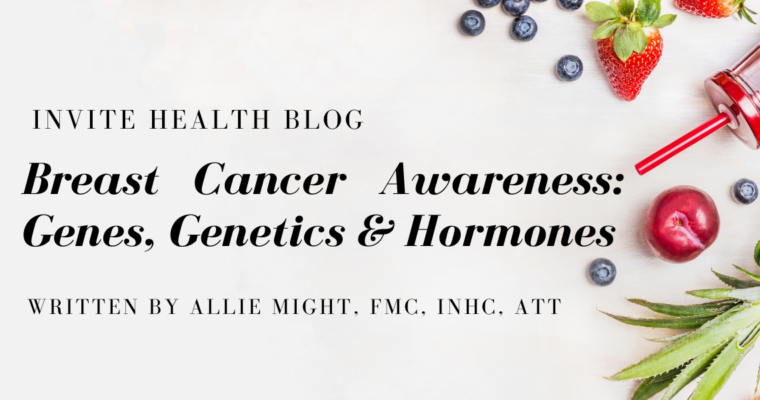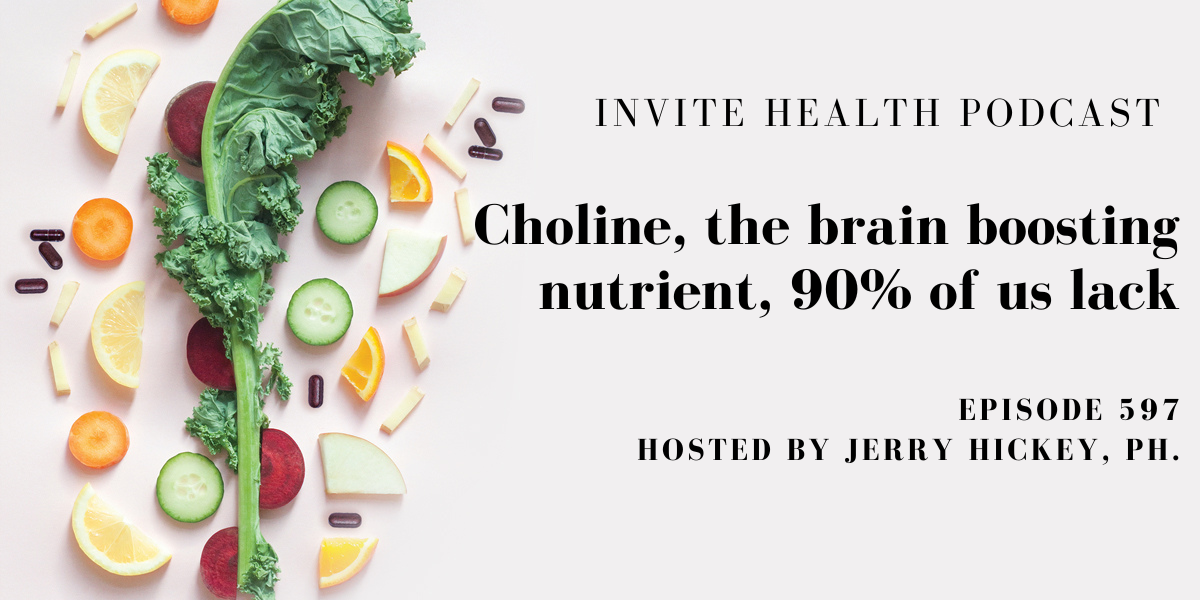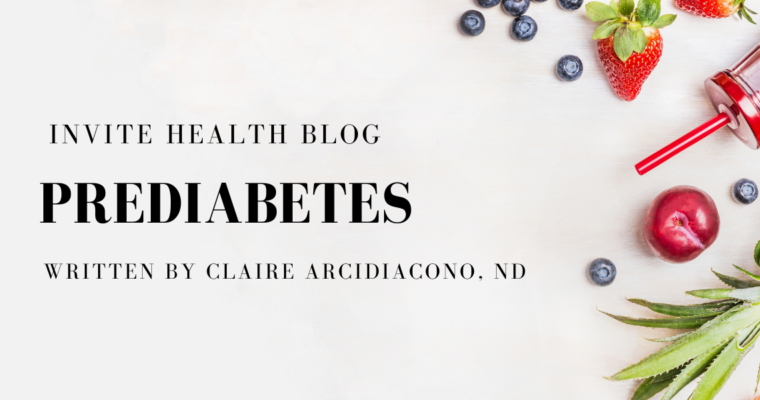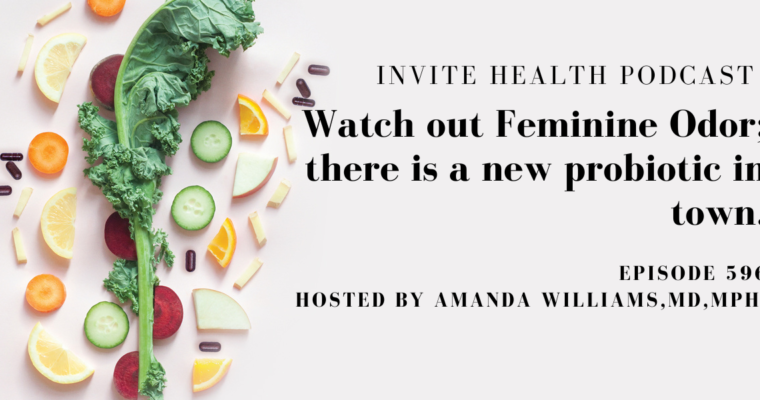Subscribe Today!
Please see below for a complete transcript of this episode.
ALZHEIMER’S DISEASE, IMPORTANT NEW STRATEGY- INVITEⓇ HEALTH PODCAST, EPISODE 595
Hosted by Jerry Hickey, Ph.

*Intro Music*
InViteⓇ Health Podcast Intro: [00:00:04] Welcome to the InViteⓇ Health Podcast where our degreed health care professionals are excited to offer you the most important health and wellness information you need to make informed choices about your health. You can learn more about the products discussed in each of these episodes and all that Invite Health has to offer, at www.invitehealth.com/podcast. First time customers can use promo code podcast at checkout for an additional 15% off your first purchase. Let’s get started.† [00:00:34]
*Intro Music*
Jerry Hickey, Ph: [00:00:41] Jerry Hickey, nutritional pharmacist here. There’s a real problem with the research going on for Alzheimer’s disease. About 100 drugs in research have failed. That’s tragic and it’s likely the way we’re looking at Alzheimer’s, of course. So there is new way of looking at Alzheimer’s. And it’s a very important change in paradigm. And there’s also things you could do to help prevent Alzheimer’s. So all of this and more we’re going to discuss over the course of this episode, Alzheimer’s disease, new theories and what can help. Hi, my name is Jerry Hickey. I’m a nutritional pharmacist. Invite Health has hundreds of high quality podcast episodes, I’m not the only one who does these episodes, and you can find them for free wherever you listen to podcasts or just go to our website, www.invitehealth.com/podcast. And if you could subscribe and leave a review, it would be very helpful for us, wherever you listen to this. We’re also found on Instagram, Twitter and Facebook at Invite Health. So I want to get going on this discussion. It’s an important discussion. A new way of looking at Alzheimer’s has come out of the Karolinska Institute. The Karolinska Institute is in Stockholm, Sweden, and they are a very high quality research institution. It’s kind of akin to our Johns Hopkins or Tufts. They do a lot of great work, they hand out some of the Nobel Prizes, prizes like the Nobel Prize in Medicine, Nobel Prize in Physiology. So we’re going to be discussing their new information that was just published in the Journal of Alzheimer’s Disease in just a minute. But first, a little background in Alzheimer’s disease. Of course, everybody knows what Alzheimer’s, while you’re not may not know the first part, it takes many decades to develop. And most people and many people, it’s lifestyle choices that lead to the Alzheimer’s. We’ll discuss genes in a minute because some people have changed that, increase the risk, the likelihood of them developing Alzheimer’s and of course, Alzheimer’s disease, I mean, pretty soon once it hits the ground running, once it’s really developing and you’re developing symptoms, it proceeds at a very fast pace. And it’s not very long before people can look in the mirror and not know who they are. So it’s a very sad thing. In 1906, there was a doctor, Alzheimer’s, they named a disease after him. Obviously, he was a neuro anatomist, he was a psychiatrist. And he was reporting to a whole group of psychiatrists in Germany on the case of a 50 year old woman. She suffered with severe memory loss. She had delusions and hallucinations, she was confused. She became very aggressive at times. And during her autopsy, Dr. Alzheimer’s noticed very distinctive plaques on her brain. These were made out of clumps of a protein called amyloid beta. Now, just a word on that. Amyloid beta is a protein that the brain uses for actual activity’s functions. It’s important in the brain. But in the Alzheimer’s patients, he noticed that it clumped together and create these insoluble masses called plaques that become very toxic to the brain. Now drug discovery has focused on removing these plaques, which make sense. There’s a problem. Now, actually, two big problems that are evident. One, many people who have these plaques, their brain goes on functioning. That memory goes on working. They don’t develop the neurological symptoms. The second thing is, in about 100 drug trials, the drugs created to reduce these plaques are not successful in clinical trials in helping Alzheimer’s patients.† [00:05:02]
AMYLOID BETA PROTEIN
[00:05:06] Now here’s where they’re going with the research. And this has been evolving over a decade or two. The amyloid beta protein as it clumps together, it creates these massive stutter insoluble plaques and it blocks the original protein, the soluble form of the protein called amyloid beta number 42, from doing its duties in the brain. So this is what the doctors, the researchers at the Karolinska Institute are actually looking at. Is it that it’s the plaque that are bad or is it the lack of beta amyloid number 42, the function of it that’s bad. Is it a lack of this to begin with or is it the plaques that it’s turned into? Now, some studies show that a drop in the level of amyloid beta 42 to soluble form leads to worse symptoms in Alzheimer’s patients. And a poorer prognosis. A prognosis is the doctors forecasting what’s going to happen. So they wind up with a poor prognosis. Now, the researchers, this is good because this is strong, strong evidence. And I’ll explain. The researchers looked at groups of people who have rare gene mutations that lead to Alzheimer’s disease that increased their risk greatly of developing Alzheimer’s disease. And why is this strong evidence? Because if you could do something for these people, imagine what you could do for the regular, regular person, the everyday person who doesn’t have an increased first genetically hereditary increased risk of developing Alzheimer’s disease. That’s why this is very important. So they looked at two rare forms of people who inherit genes from their parents and increased their risk of Alzheimer’s disease, the Osaka gene or the Arctic mutation. These people do not develop plaques, but they develop hereditary Alzheimer’s disease. They literally have low levels of the form of beta amyloid called 42, which is the functional form. So the researchers at the Karolinska Institute found that lacking the soluble working form of amyloid beta 42, was more important to causing Alzheimer’s disease than the total amount of plaque that was formed in the brain. The people in the study with the gene mutations, but they had higher levels of amyloid beta 42 the one that works, that does important things in the brain, were protected. The cognitive function was protected over an average of three years, follow up in the trial. So this is very important. Now, let’s get to my next part of of this discussion.† [00:08:10]
LIFESTYLE & DIET
[00:08:12] Most of us don’t have genes. And I’ve done reports, I’ve done podcast episodes on some of the genes involved with Alzheimer’s disease, increasing the risk. But most of us do not have an increased risk of developing Alzheimer’s. As far as we know so far, due to heredity, we didn’t get gene mutations from both our mother and our father together that would increase our risk of developing Alzheimer’s disease. And, you know, perhaps there’s a number of different types of Alzheimer’s disease also, that seems to be what’s what’s occurring. We do know there are certain risk factors for Alzheimer’s disease. The risk factors for heart disease are generally the risk factors for Alzheimer’s disease. So a terrible diet, not eating your vegetables, not exercising, being very overweight, having high blood sugar, having high cholesterol, having heart disease, all of these things increase the risk. So part of it is lifestyle, and part of it is having health conditions. Now, what protects us just the opposite. There’s evidence that diets can help. I did a study on the mind diet. I shouldn’t say I did a study. I did an episode on the studies of the mind diet. That’s what I should say, pardon me. And it showed that eating certain patterns of food really had an impressive effect on lowering the risk of developing Alzheimer’s, something like 50%. The mind diet comes out of Rusk Institute over in Chicago, and they put together different foods from the Mediterranean diet, which is a pattern of eating in parts of Europe, like in parts of Italy, etc.. And and the dash diet, which was created to help prevent high blood pressure and heart disease. So it’s lower salt, etc., avoiding certain foods. And when they put these foods together and people who really followed it the most really had a big decrease in risk of developing Alzheimer’s disease. So diet does mean something. And sometimes, is it what you’re eating? Like, are you eating bad foods or is what you’re not eating? Like, you’re not eating your broccoli? It’s actually both of those. If you’re eating terrible foods and you’re not eating good foods, that’s the worst thing. If you’re eating terrible foods, but you’re having a lot of good foods, not as bad, but not the way to go. If you have a really good, sound diet, well, that’s the way to go. You know, fish, lots of vegetables, mushrooms, lots of legumes, whole grains. Keep the salt down, keep the alcohol down, don’t smoke, all those things important, exercise is important. Being social is important, good reason to go introduce yourself to your, to your neighbors or joining a club, challenging your brain with new things, I do all the time, is very important. But also the following nutrients, there are nutrients that absolutely have a keen effect on the brain, and we’re also going to discuss one drug. Look at them in a couple of minutes. Because most drugs had no impact on Alzheimer’s, by the way, there was some evidence recently that certain anti diabetes drugs might help reduce the risk of Alzheimer’s. So that’ll be a different episode, different podcast episode.† [00:11:44]
ICYMI: MAGNESIUM: IT’S HELPFUL FOR A HEALTHY & HAPPY BRAIN- INVITE HEALTH PODCAST, EPISODE 585>>LISTEN NOW
FISH OILS & THE BRAIN
[00:11:45] Now, we already did reports on fish oils in the brain. I mean, we’ve done, fish oils are important for your muscle health. They’re important for your bone health. They have some impact on breast health and colon health. They lower the risk of sudden cardiac death, which is reason enough to take fish oils. But they also are that’s based on many, many, many scores of human clinical trials. But they also, and those are cross-sectional trials and longitudinal trials. I’ll explain what that is in a minute. Well, I’ll tell you quickly, a cross-sectional trial looks at a large group of people at a certain point in time, like if they had a lot of fish and a lot of fish oils in their blood, was at a lower risk of dementia. A longitudinal study will follow a lot of people for a long time, which is kind of stronger info. But we discussed fish oils in previous podcast episodes on the brain. There was some research not getting enough DHA, about 200 milligrams a day. One of the fats in fish oils lowered the risk of Alzheimer’s by something like 36% lower the risk of Parkinson’s disease a little bit. Fish Oils do a lot of things in the brain. They create resolvins, which help protect the brain. They help create tissues in the brain. They help create protectins in the brain and also in the eyes. By the way, all these things are important for the brain and in particular the ingredients in krill oil, the phosphatides, the Phosphatidylcholine and fish oils, combine to create basically bulletproof vests for each cell in your brain. So these things have a number of effects to the brain, the fish oils. There’s different fats in fish oils that are great for the brain. Well, absorbed turmeric, we’ve done episodes on well absorbed turmeric. Turmeric has something like 145 different ingredients, the best known one is curcumin. And these ingredients are very, very functional in the brain. The essential fatty acids and the curcumin and bisdemethoxycurcumin etc. Help protect the brain from plaques. And they’ve shown that a well absorbed turmeric, turmeric in general, the curry herb is very poorly absorbed by us humans, but the well absorbed ones that are available in supplements really get into the bloodstream and get into the brain. They’ve been shown to help with memory, reduce feelings of stress in the brain, even especially in older people, and help protect the brain, lowering the risk of Alzheimer’s. Vitamin E and vitamin C. In fact, I’m going to touch on that now, previously, I did a report on vitamin E and Vitamin C in conjunction how they lowered the risk of developing dementias across the general public, which is a great benefit. But new stuff has emerged, there were effects. One last thing going back to fish oils, fish oils lower something called ceramides. Now normal levels of ceramides are needed to create skin and cells, etc. But when certain forms of ceramides are high, they make your bad cholesterol very invasive and they make it very dangerous. But they’re also involved with Alzheimer’s. They’re connected with high blood sugar and obesity, fish oils, lower ceramides, ceramides when they’re, like I said, when they’re elevated, are bad for the heart and the brain.† [00:15:12]
VITAMIN D & THE BRAIN
[00:15:14] So let’s go to certain supplements that have been shown to reduce the risk of dementia in general and Alzheimer’s. I’m not going to go into the vitamin K studies because I don’t believe there’s enough of them at this point. But it’s very interesting. And there are receptor sites for vitamin K in the brain. We’ll talk about receptor sites exact, as we’re going to talk about vitamin D, there’s receptor sites for vitamin D located throughout your brain. So receptor site is kind of like a key fitting in to a key hole, there is only certain keys that fits certain keyholes. So receptor site for vitamin D, only vitamin D can interact with it. So Vitamin D is obviously needed by the brain. And in our brain, Vitamin D supports the removal of plaques, the plaques that accrue in the brain, and they’re kind of sticky, tarry things that contribute to developing Alzheimer’s. They damage, they inflame the brain, they’re involved with Alzheimer’s, and they do this without lowering beta amyloid 42. Amyloid beta 42. But Vitamin D does other things in the brain. Vitamin D helps the function of the blood vessels within our brain and they reduce the risk of developing a stroke. Also, strokes are involved of course, with developing dementia, multiple mini strokes and massive strokes, the blood vessels of the brain have to deliver the nutrition, the oxygen, etc. So if they’re not functioning well, it’s bad. You need vitamin D for them to function properly. Now, the David Geffen School of Medicine is at UCLA, and they looked at the blood of Alzheimer’s patients and they found that if they added vitamin D to the blood, it reduced greatly inflammatory components that are bad for the brain. Cytokines and chemokines that trigger inflammation in the brain that contribute to the onset of dementia. But in the same study they found that resolvins also protected the brain would help protect the brain by lowering inflammation on the brain. Resolvins once again are made out of fish oil. So the David Geffen School of Medicine looked at both vitamin D and fish oils. Now a separate place, Journal of Aging Research, this is April 30th, 2020. Vitamin D helps regulate important natural brain chemicals known as tau transmitters that make the brain work normally, that are involved with judgment and problem solving and figuring out where you are and learning and remembering. But they also say that vitamin D in the brain is a powerful anti-inflammatory agent. Now, that’s interesting because dementia occurred generally when you’re older, inflammation increases as we all grow older. And there’s a reason for that. Part of the reason is a decline in antioxidant levels. Antioxidants snuff out free radicals that would otherwise inflame and damage the brain and kill brain cells. So Vitamin D helps regulate important neurochemicals in the brain. And it’s an anti-inflammatory, but it functions to make the antioxidants like vitamin E and vitamin C. These are very important in our brain. Work better, it also increases the release of neurotrophic factors. Now, that’s very important.† [00:18:32]
NEUROTROPIC FACTORS
[00:18:33] Neurotrophic factors heal the brain and help create new memory cells. Neurotrophic factors like nerve growth factor and brain derived neurotrophic factor. You released them at night when you’re in deep sleep and these foster the creation of new memory cells. We didn’t know this like ten years ago that you could create new memory cells. We thought when you lose memory cells, that you know that over time we lost more and more and there’s nothing you can do about it. But evidently, a young, healthy person who goes to sleep and sleeps a good, solid six, seven, 8 hours can create 600, 700 new memory cells every single night. That’s important because they lost them the day before. But that slows down with age and vitamin D helps restore that. Zinc does a little bit, by the way, and so does turmeric, which is another reason why turmeric soluble well absorbed turmeric like by a biocurcumin, form a turmeric. Turmeric with biopiperine in it, you know, the black pepper substance, where they’re good for the brain, they are really good for the brain. So besides helping the function of the brain chemicals and causing a release of growth factors such as nerve growth factor, you know neurotrophic factors. Vitamin D has been shown to help prevent the formation of plaques in the brain, and it forces the clearance of the plaques. Now cross-sectional study showed that vitamin D is consistently and significantly lower in patients with Alzheimer’s disease. So once again, a cross-sectional study is looking at a group of people at one point in time. So they took Alzheimer’s patients, they looked at their blood Vitamin D was low. But in longitudinal studies, these are observing patients over a long period of time. But looking at one specific thing, and in this case, vitamin D with cognitive function, they found that you can connect low vitamin D with cognitive impairment and Alzheimer’s disease. And even in meta analysis of many types of studies and many studies, they found the same thing. Low vitamin D is involved with losing brain function, losing memory and onset of Alzheimer’s disease. There’s many, many, many other studies showing this.† [00:20:48]
METHYLATION
[00:20:49] Now, I want to talk about folate again, because it’s so important for the brain and heart. Folate is a B vitamin. It’s commonly known as folic acid in your multivitamins or your B-complex vitamins, or when it’s added to cereals and breads, etc. and a reason they add it to cereals and breads is that, if a woman is pregnant in the first trimester, the baby can have serious birth defects if they lack folate, folic acid. And it’s called folate because it’s ubiquitous in foliage and different foods and plant products, etc.. That’s how it got that name. So without folate, the brain may not develop, the face may not develop the spine, and the skull might not develop properly. There’s all kinds of birth defects that can occur, like cleft palate. By the way, another B vitamin called choline is a similar risk with that, if you lack choline, problem during pregnancy. But they’re not adding choline to prenatal vitamins that they give pregnant women. So they add the folate to food so that if a woman’s pregnant and she doesn’t know what she’s getting the support nutrient for the development of the fetus. But folate also lowers the risk of of cancer. It helps regulate genes and protects genes. It’s called proper methylation. It attaches to genes and blocks things like cigarette smoke and viruses and radiation from damaging the genes. And as you know, if it’s the wrong kind of mutation caused by a virus or cigarette smoke or radiation, etc., if it’s the wrong kind of mutation and it’s copied, it can greatly increase the risk of of cancers. A lot of cancers occur like this. So it helps inhibit the first two steps of the cancer process, initiation and promotion, where something in the environment is affecting your genes and increasing your risk of of of of of developing cancer. But that’s not where we’re going with this. We’re talking about folate, reducing homocysteine. Homocysteine is naturally found in the body. It’s a product of protein metabolism, but when it’s too high, it’s very unstable. That’s been found to damage bone damage to heart, contribute to eye disease, contribute to depression, but also really increase the risk of Alzheimer’s disease. And folate is the best thing for lowering it. And the most active form of folate is methyltetrahydrafolate. That’s the active form. So that’s important to know. Folic acid is not the active form of of folate, methyltetrahydrafolate is the active form which is abbreviated MTHF. Some people cannot convert the synthetic folic acid in a multivitamin into MTHF and they can wind up with Alzheimer’s because of that. So it’s important if you get a multivitamin, get that methyltetrahydrafolate form of folic acid in there, a folate in there.† [00:23:46]
ICYMI:AN ANTI-AGING HERB THAT HELPS PROTECT THE BRAIN – INVITE HEALTH PODCAST, EPISODE 572>>LISTEN NOW
ANTIOXIDANTS & THE BRAIN
[00:23:46] Now, vitamin C and vitamin E, there’s studies on, this is going back even 20 years that taking vitamin C and vitamin E together really reduces the risk of developing Alzheimer’s across the general population strongly. Now, the vitamin E has to be natural because synthetic vitamin D is not the correct structure. The vitamin C does not have to be natural because the synthetic one is fine. It’s the correct chemical structure. So why vitamin C is needed to create the coding, the insulation on the nerves in our brain is also a very good antioxidant in the brain, like in the gray matter, it helps prevent cellular damage by reducing cellular inflammation that’s triggered by free radicals. It’s also needed for the brain’s neurotransmitters to function properly, you know, like acetylcholine for learning and memory and problem solving or glutamic acid and glutamate for brain energy or GABA to relax the brain and for learning things like that. Dopamine, so you know, the benefits of risk and reward, etc., things like that. So you need vitamin C for those to function properly. And vitamin E is an antioxidant of note in fatty tissues. Vitamin E is fatty soluble. So why should that be important for the brain? The brain is 60% fat. That’s why it’s so important to eat the right fats and not the wrong fats because the wrong fat, if your brain is starting to get made out of the wrong fats and fats make up so much of a brain, the brain will not function properly, so you want the correct fats. So the vitamin E is a powerful antioxidant in the fatty compartments of the brain, so protects the brain from inflammation and cell damage and cell death. But it’s also needed for electrical conductivity in the brain. Just a brain is super high energy. There’s a lot of electrical impulses in the brain and it’s important for nerve function. That is a simple answer for these supplements.† [00:25:43]
FINAL THOUGHTS
[00:25:44] Take a really good, high quality multivitamin and take fish oils. The multivitamin will have the folate, the vitamin C, the vitamin E and it’ll have other nutrients you can and it’ll have some vitamin D, at least you’re getting some, you can add some vitamin D, you can add fish oils, you can also add a well absorbed turmeric like bio-curcumin. So a multivitamin, some additional vitamin E, fish oils, make sure it’s rich in DHA, 100 to 200 milligrams per capsule and and make sure it’s a well, a well-made fish oil, so it’s fresh. And you can do krill. Certainly, certain krill products are fantastic for the brain because you’re also getting, choline, for memory functions and to do a well absorbed turmeric and you’re set. So in any event, thanks for listening to this episode of the InViteⓇ Health Podcast. You can find all the episodes for free wherever you listen to podcasts and please subscribe and leave a review or just go to, invitehealth.com/podcast. You can also find invite as InVite Health on Twitter and Instagram and Facebook. I want to thank you for listening to today’s episode. Hope to see you next time, on another future episode of InViteⓇ Health Podcast. Jerry Hickey signing off. Have a great day.† [00:25:44]
*Exit Music*


